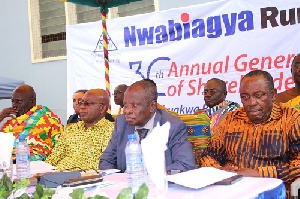Nwabiagya Rural Bank Limited at Barekese in the Atwima Nwabiagya district of Ashanti Region has posted another remarkable operational performance in all its 2017 financial indicators.
The bank recorded a pre-tax profit of approximately GH¢4.7million in the 2017 year under review, representing 18% growth which is a little over the GH¢4million recorded in the previous year.
The bank’s directors have recommended a dividend payment of GH¢ 0.065 per share for the year 2017 on 17,815,183 ordinary shares which qualified for dividends. This brings total dividend payable to GH¢1,157,987. This is against GH¢0.060 on 17, 278, 340 ordinary shares for the year 2016.
The bank’s paid-up capital increased from a little over GH¢2.3million in December 2016 to approximately GH¢ 2.6million as at December 31, 2017, recording an increase of GH¢266,052 as at the close of year 2017.
The number of shares issued also went up from 17,313,007 to 17,845,110 – showing an increase of 532,103.
The bank’s net worth also grew, from GH¢14,091,240 in December 2016 to GH¢15,834,683 at the end of December 2017. This came about as a result of the bank’s impressive performance over the years.
The Board of Directors Chairman, Nana Dr. Owusu Sarfo Anwona II, announced these and more at the 30th Annual General Meeting of shareholders held last Friday at Abuakwa near Kumasi.
According to him, the BoG prime rate had been 26 % from January 2017 to March 2017 when the Monetary Policy Committee adopted a loose approach to monetary policy by reducing the prime rate to 23.5 % in March 2017. This new rate persisted till March 2018 when it was reduced to 18%, which was further reduced in May 2018 to 17%.
The business environment over the period of March to December 2017 was generally favourable because the cedi was relatively stable against the major currencies of the world coupled with the reduction in interest rates and a continued drop in inflation that had started from March 2017.
With all the developments described above, private sector credit growth could not match the rate expected. Private sector credit growth rather declined by 3.6%, decreasing from GH¢156.7billion in April 2017 to GH¢151.1billion in April 2018.
In spite of the challenging developments in the Ghanaian economy described above, Nwabiagya Rural Bank once again put up a satisfactory performance in the 2017 year under review, recording an average growth rate of 18% in all indicators as shown in the table below.

The bank continued to offer assistance to communities and institutions within its operational territories in terms of community development projects to the tune of GH¢96,905 in fulfillment of its social responsibilities. The figure for the year 2016 was GH¢176, 521. The big drop from the 2016 figure to that of 2017 is accounted for by the fact that completion of the Abuakwa branch project was the bank’s priority.
The major economic areas that benefitted include Education, Health, Sports, Recreation, Security and Farmers’ Day celebrations.
Touching on future plans of the bank, the Board chairman said it is yet to complete the process of introducing its trader-customers and, particularly, market women clients to the modern Point of Sale (POS) devices that will make the placement of deposits and other products very convenient for the bank’s “very busy” customers.
The Board chairman in his concluding remarks appreciated shareholders’ patronage in purchasing the bank’s shares. He, however, said it had been observed, with some regret. that there were some shareholders whose shareholdings were too small to earn them reasonable dividends.
He, therefore, advised that all existing shareholders should endeavour to increase their shareholdings so they can maintain community-ownership of the bank and help it to stay above the regulator’s mandatory requirement – and in effect make Nwabiagya Rural Bank one of the strongest rural banks in Ghana.
Business News of Saturday, 22 September 2018
Source: thebftonline.com













